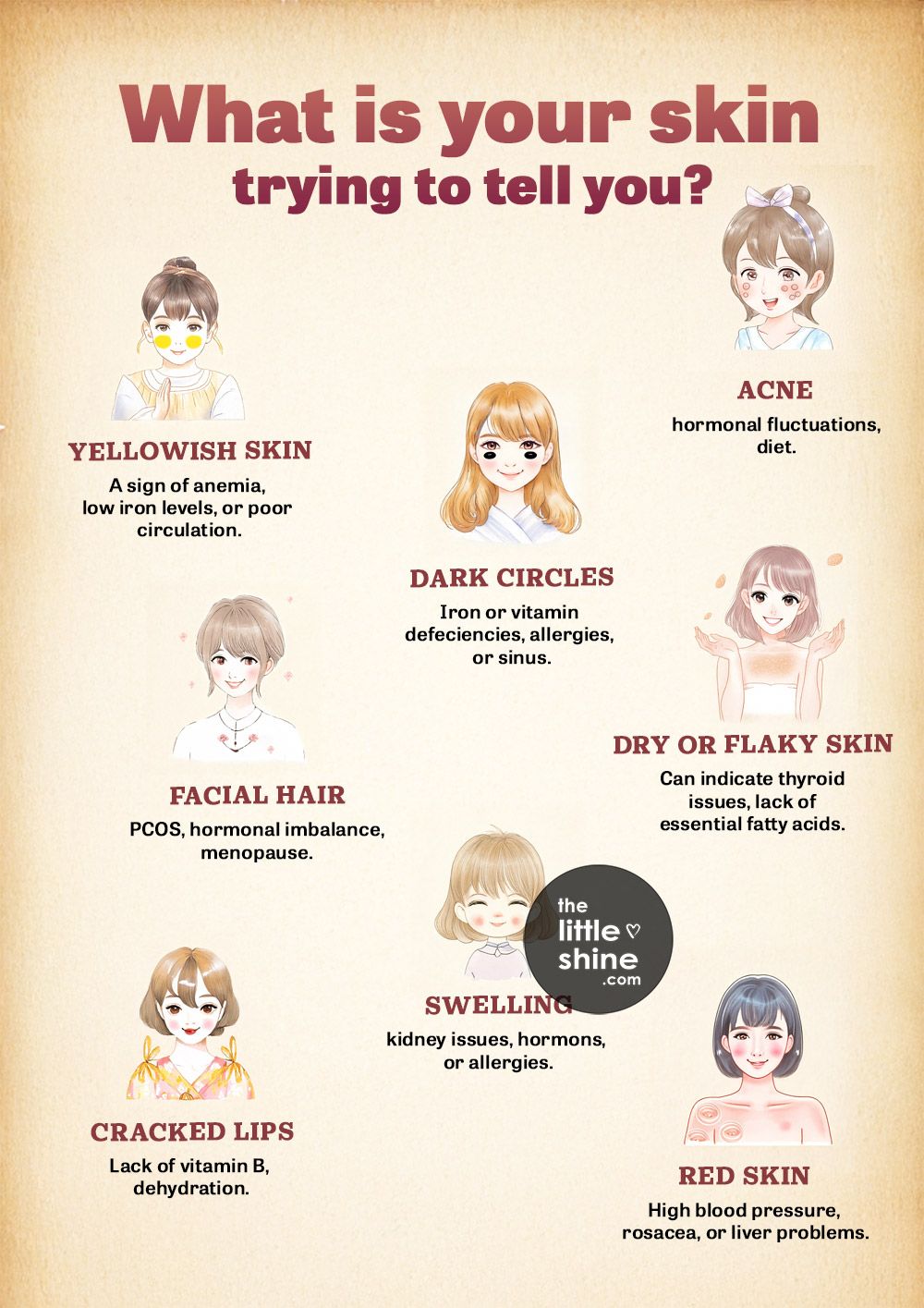Do you sometimes find your skin looking a little yellowish, your skin has developed acne, you’ve started seeing dark circles and facial hair?

Well, your skin can speak a lot about your facial health without you evening knowing it. Pale and yellowish skin can indicate anaemia, dark circles can indicate iron and vitamin deficiencies and the list goes on.
So, in this article, you can learn all about what your skin says about your facial health and this way, as soon as you start seeing any of these symptoms, you can get yourself treated before it gets worse or leads to other problems.
Types of Skin Problems and Their Causes
1. Yellowish Skin
Signs of:
Anemia: Wherein the red blood cells in the body doesn’t create enough oxygen, thus making you tired and lethargic.
Low iron levels: “Sallow” is a yellowish hue on the skin, when someone has low iron levels.
Poor blood circulation: If there isn’t proper blood circulation in the body, the skin color can turn pale and yellowish.
2. Dark Circles
Signs of:
Iron and vitamin deficiencies: Deficiency or iron and vitamins like K, B12, folic acid etc., can cause dark circles under the eyes.
Allergies and sinus: Allergic shiners (due to hay fever, pet dander, dust mites, food allergies etc.,), can cause dark circles under the eyes.
3. Acne
Signs of:
Hormonal fluctuations: Acne can be caused due to hormonal fluctuations, resulting in the skin producing more oil, clogging the skin pores, leading to acne.
Diet: Certain foods can cause the development of acne, as the foods can cause changes in the hormones, leading to acne formation.
4. Facial Hair
Signs of:
PCOS: Polycystic ovary syndrome (PCOS), causes a condition called hirsutism, which causes excessive facial hair growth.
Hormonal imbalances: Hormonal imbalances like adrenal gland disorders, thyroid issues, PCOS etc., can cause facial hair.
Menopause: Women experience facial hair growth during menopause due to hormonal imbalances (wherein estrogen levels drop significantly and testosterone levels remain constant).
5. Swelling
Signs of:
Kidney issues: Nephrotic syndrome, is where the kidneys lead a lot of protein into the urine and this can cause fluid retention and facial swelling (and swelling all over the body).
Hormonal issues: Hormonal issues linked with Cushing’s syndrome (high cortisol levels), hypothyroidism (low thyroid levels) etc., can cause facial swelling.
Allergies: Allergies, infections, injuries, certain medications etc., can all be a cause of facial swelling.
6. Dry or Flaky Skin
Signs of:
Thyroid issues: Thyroid issues, especially hypothyroidism (low thyroid levels), can cause dry or flaky skin.
Lack of essential fatty acids: If you lack essential fatty acids (EFAs) in your diet, can cause dry or flaky skin.
7. Cracked Lips
Signs of:
Lack of vitamin B: Vitamin B deficiencies can cause cracked lips and can also be a cause of dry skin, acne, rashes, wrinkles etc.
Dehydration: If your body is dehydrated, this can be a cause of cracked lips. This is because one doesn’t drink/consume enough of water, leading to skin dryness, further resulting in cracked or chapped skin.
8. Red Skin
Signs of:
High blood pressure: Facial flushing, leads to red facial skin and this can sometimes be associated with high blood pressure (as they blood vessels in the face get dilated).
Rosacea: Rosacea is a chronic skin condition that causes the facial skin to turn red and also leads to the formation of pimples and broken/torn blood vessels on the face. It can also affect the chest, the neck and the eye areas.
Liver problems: If you have a liver problem or are a risk of potentially developing a liver problem, it can cause the facial skin to turn red/reddish. This is because liver issues can disrupt hormonal balance and can lead to an increased blood flow to the face, causing the visible redness.
